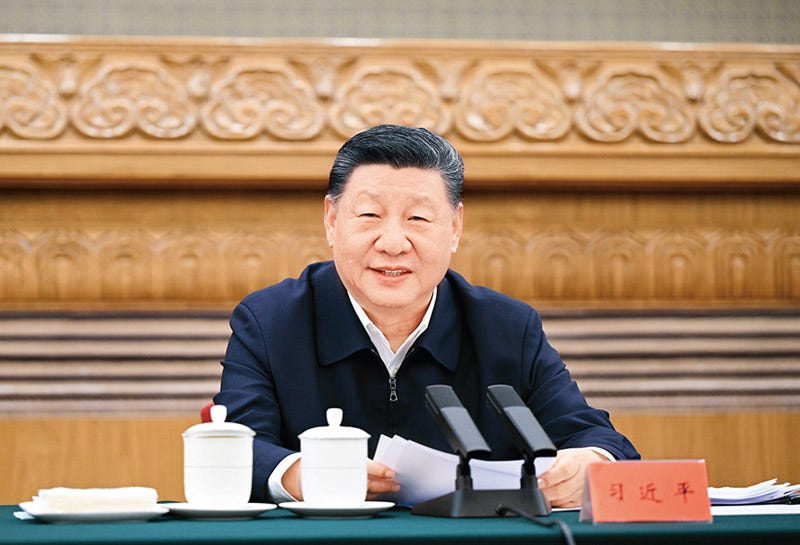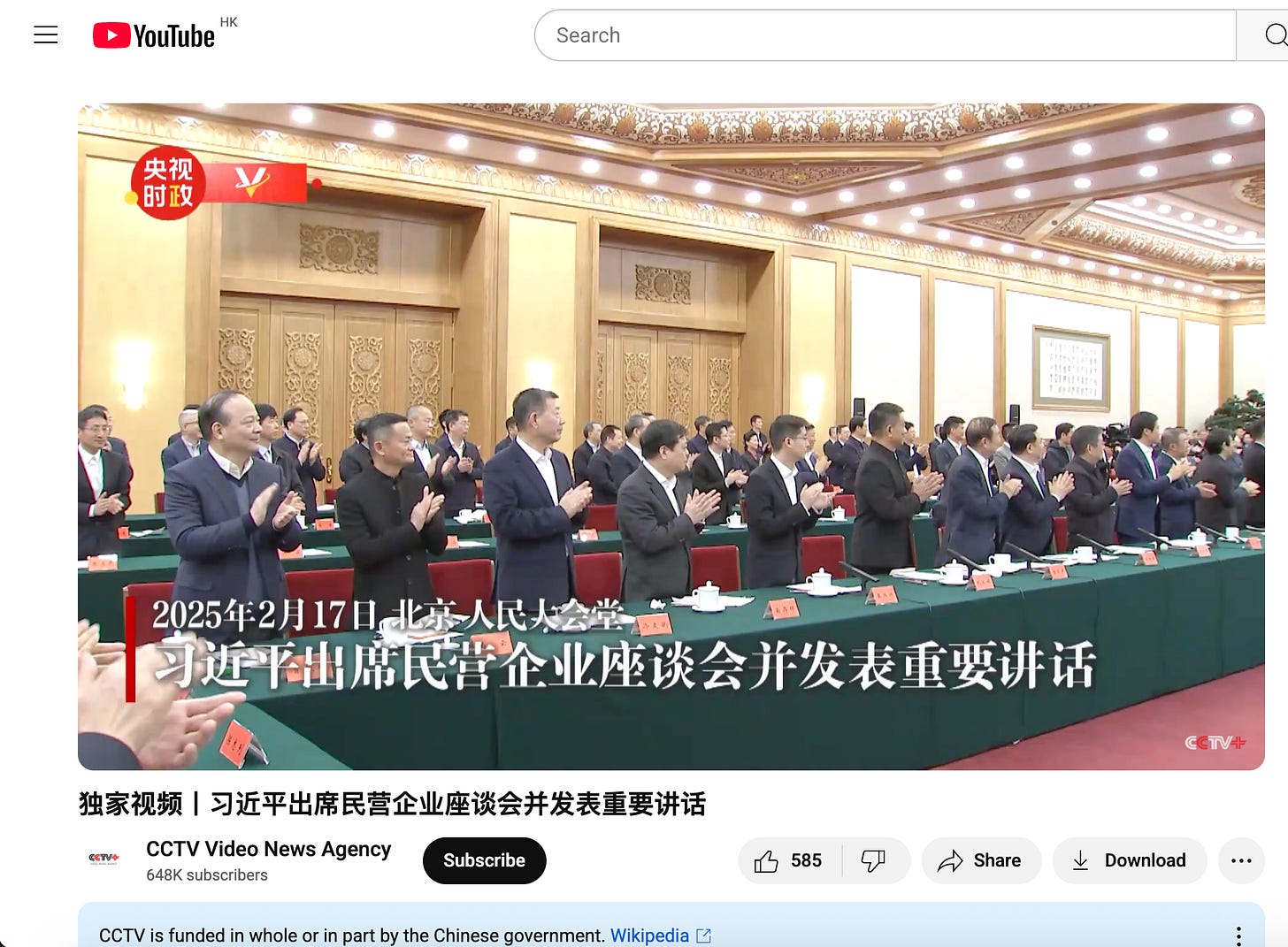Xi's speech to private entrepreneurs in Feb 2025 now available
What did Jack Ma, DeepSeek's Liang Wenfeng, and BYD's Wang Chuanfu hear from China's top leader?
Back on Feb 17, 2025, Xi Jinping’s meeting with leading private entrepreneurs, including Jack Ma, made national and international headlines.
The private entrepreneurs who spoke at the meeting include
Ren Zhengfei — Founder and CEO, Huawei Technologies
Wang Chuanfu — Chairman and CEO, BYD
Liu Yonghao — Chairman, New Hope Group
Yu Renrong — Founder and Chairman, Will Semiconductor
Wang Xingxing — Founder and CEO, Unitree Robotics
Lei Jun — Founder and CEO, Xiaomi Corporation
China Central Television footage showed the presence of:
Pony Ma — Founder and CEO, Tencent
Jack Ma — Founder, Alibaba Group
Liang Wenfeng — Founder, DeepSeek
and many other leading businesspeople.
As usual, Xinhua, the state news agency, published a readout [CN] [EN] of the meeting, which includes excerpts of his remarks at the meeting.
Full speeches, or at least the majority of the full speeches of Xi, in these events, are sometimes released simultaneously, but often released later via Qiushi/Seek Truth, the Communist Party of China (CPC) Central Committee’s bi-weekly journal, or other means, such as in books.
Half a year later, the latest Qiushi/Seek Truth, on Friday, August 15, in its 16th issue of 2025, published the “main part“ of Xi’s speech, a much fuller version than the readout.
The South China Morning Post, indispensable to China watching, has timely put out a news report based on the latest disclosure yesterday.
Below is a full translation of the speech provided by Qiushi/Seek Truth. All highlights are mine only.
促进民营经济健康发展、高质量发展
Promoting the Sound and High-Quality Development of the Private Economy
by Xi Jinping
The Communist Party of China (CPC) Central Committee has convened this symposium to hear directly from private-sector entrepreneurs, engage in in-depth exchanges, unify thinking and bolster confidence, further push for the resolution of outstanding problems impeding the development of the private economy, and encourage and support the vast number of private enterprises and entrepreneurs to rise to challenges and forge ahead, so as to promote the sound and high-quality development of the private economy.
Private enterprises have flourished alongside the great journey of reform and opening-up; this is something everyone has experienced personally. I myself took up leadership posts at the beginning of reform and opening-up. From Hebei to Fujian, to Zhejiang, to Shanghai, and then to the central leadership, I have always attached great importance to supporting the sound development of the private economy and to the healthy growth of private entrepreneurs.
For decades, the CPC’s theoretical understanding and practical policies regarding the private economy’s role in reform, opening-up, and socialist modernization have advanced with the times. Since the 18th CPC National Congress, the Central Committee has issued multiple documents and I have spoken on the subject and given instructions on many occasions. The Party and the state’s fundamental principles and policies on private-sector development can be summarized as follows:
The Communist Party of China leads the people in developing the socialist market economy; the non-public sector is an important component of our country’s socialist market economy and is protected by the Constitution and the laws; the Party and the State uphold and improve the basic socialist economic system, unswervingly consolidating and developing the public sector while unswervingly encouraging, supporting, and guiding the development of the non-public sector; the Party and the State ensure that economic entities under all forms of ownership enjoy equal access to factors of production in accordance with the law, participate in market competition on an equal footing, and receive equal legal protection, promote the complementary strengths and common development of all forms of ownership, and foster the sound development of the non-public sector and the healthy growth of those working in it. These basic principles and policies have been incorporated into the system of socialism with Chinese characteristics and are explicitly embodied in the Constitution and the Party Constitution; we will consistently uphold and implement them, they cannot be changed, and they will not be changed. When we speak of promoting the development of the private economy, this is the fundamental and overarching premise. This is the fundamental premise for any discussion about promoting the private economy.

Below, I wish to offer three opinions
1. In the new era and on the new journey, the private economy enjoys broad prospects and great potential.
Since the 3rd Plenary Session of the 11th CPC Central Committee, the Party’s policy of reform and opening-up has created unprecedented historical opportunities for the rapid growth of the private economy. Today, China’s private sector has reached considerable scale and weight. Private enterprises account for more than 92% of all enterprises; more than 420,000 of them have been certified as national high-tech enterprises—again over 92% of the total. They contribute more than half of China’s imports and exports and tax revenue, and over 80% of urban employment. Their overall strength, innovation capacity, and market competitiveness have risen markedly, laying a solid foundation for high-quality development.
On the new journey in the new era, China’s productive forces will continue to leap forward, living standards will steadily improve, reform and opening-up will deepen across the board, education and scientific-technological undertakings will advance rapidly, the ranks of talent and labour resources are both vast and high-calibre, the industrial and infrastructure systems are well-coordinated, and new industries, business forms and models are emerging in a steady stream. A supersized domestic market of more than 1.4 billion people holds tremendous potential, offering the private economy many new opportunities and greater room for growth. Most importantly, the strengths of socialism with Chinese characteristics—especially the socialist market economy and the socialist rule-of-law system—are being continuously refined, providing still stronger guarantees for private-sector development. The political, economic, and social environments are all highly favourable; this is the right time for private enterprises and entrepreneurs to give full play to their abilities.
Of course, we must remain clear-eyed: the private economy does face certain difficulties and challenges. Notably: The new wave of technological and industrial revolution is hitting some traditional private enterprises hard. Some technology-intensive and export-oriented firms are under pressure. Some private enterprises have diversified blindly and suffer from poor market judgment or management. In some regions the business environment is sub-optimal, and measures to support the private economy are not fully implemented. There are still some discordant voices in society regarding the private economy.
How should we view and deal with these problems? In my judgment, these difficulties and challenges are: Generated in the course of reform, development and industrial upgrading, not systemic in nature; Local rather than overall; Temporary rather than long-term; Solvable rather than intractable.
Overcoming them requires concerted effort from all sides. For private enterprises, the key is to strengthen internal capabilities, pursue reform and innovation, raise decision-making and management standards, and grow bigger through transformation and upgrading. Do not fear difficulties or be swayed by distractions. Align thinking and action with the Central Committee’s assessment of domestic and international situations and with its economic policy decisions. Amid hardship and challenges, see prospects, see light, see the future; maintain strategic focus, bolster confidence, and keep the daring yet pragmatic spirit of “love to fight and fight to win.”
2. Solidly implement policies and measures that support the private economy.
This is the current priority. Whatever the Central Committee has decided must be resolutely executed—no ambiguity, no delay, no discount. Let me re-emphasise solutions to several problems most frequently raised by private enterprises.
(1) Resolutely remove all barriers to equal access to production factors and fair market competition. This centres on market access—giving private enterprises equal development opportunities. We must accelerate the revision and release of a new negative list for market access, making the principle of “anything not forbidden is permitted” a reality. Continue to open competitive infrastructure sectors fairly to all market entities. Support capable private enterprises to lead national key scientific and technological tasks, open major national research infrastructure further to them, improve the long-term mechanism for their participation in major national projects, and encourage them to take an active part in the “Two Major Undertakings” (implementation of major national strategies and building up security capacity in key areas) and the “Two New” initiatives (large-scale renewal of equipment and the trade-in of consumer goods). We must continue to work hard to solve the long-standing problems of financing difficulties and high financing costs.
(2) Resolve the arrears owed to private enterprises. To untie this knot, government and state-owned enterprises—especially central-level State Owned Enterprises—must take the lead, shoulder responsibility, use instruments such as newly issued special-purpose local-government bonds, and speed up repayment. We must improve laws and regulations, and strengthen punishment for default. We must not repay one batch only to create new arrears, nor allow the problem to drag on endlessly. At the same time, we must prevent mutual arrears among private enterprises and stop private firms from defaulting on workers’ wages.
(3) Protect the lawful rights and interests of private enterprises and entrepreneurs. Two key phrases matter here: “lawful rights and interests” stresses that only lawful interests are protected, not illegal gains; “protect in accordance with law” means protection must comply with legal statutes—no “extralegal favours.” China is a socialist country governed by the rule of law; illegal conduct by any form of ownership cannot evade investigation. We must accelerate the improvement of administrative-discretion benchmarks in administrative penalties, standardise case filing and jurisdiction in enterprise-related cases, strengthen oversight of law enforcement, and carry out focused rectification of arbitrary fees, fines, inspections and seals, resolutely preventing unlawful cross-jurisdictional enforcement and profit-driven enforcement. Case review and law enforcement must be conducted in accordance with law, and the impact on normal business operations must be minimised.
(4) Implement all relief policies in earnest. In recent years, governments at all levels have rolled out many enterprise-support policies, but some private enterprises report weak “sense of gain.” To solve this, first raise policy precision—be realistic; what is promised must be delivered, and help must be real. Second, treat similar enterprises equally. For some firms, one or two measures may not suffice; comprehensive measures must be combined for a synergistic effect. Of course, enterprises must realise that ultimately their own efforts are decisive in their businesses.
(5) Further foster a 亲 cordial and 清 clean relationship between government and business. I have spoken on this many times, yet some cadres still fail to grasp the proper understanding and sometimes act simplistically. Let me reiterate: 亲 “cordial” and 清 “clean” are essentially the relationship between diligence and integrity—dialectically unified and perfectly compatible. Cadres must deeply grasp that power is for the people, responsibility is for achieving results, and integrity is for personal standing. They must consciously combine accountability with self-discipline, state their attitude, and act to build this relationship. Entrepreneurs must interact with cadres candidly and must never bribe, entrap, or corrupt officials.
Conditions differ across regions. Party committees and governments must proceed from local realities and coordinate all of the above. What can be delivered must be done at once; what cannot yet be resolved should be explained to enterprises along with work plans, and conditions must be created to solve them. Relevant central government departments must strengthen guidance and push implementation.
3. Private enterprises and entrepreneurs must bravely shoulder the tasks of the times, dare to act, and excel in action.
Enterprises are the principal market actors. While the Party and the government have the responsibility to create a favorable development environment, fundamentally, the endogenous momentum of enterprise development is paramount. Private enterprises and entrepreneurs must be pragmatic, innovative, and industrious.
(1) Be full of entrepreneurial and patriotic passion. Any undertaking—including running a good enterprise—requires commitment. In the New Era and on the new journey, private enterprises and entrepreneurs must constantly elevate their ideals, foster deep love for the country, be grateful for the great era and for the Party’s policies, remember the source of wealth and strive for progress, advance together with the motherland and fight alongside the people, and steadfastly be builders of socialism with Chinese characteristics and promoters of Chinese modernization. They must carry forward the entrepreneurial spirit—dare to venture and act boldly—and concentrate on making their enterprises stronger, better and larger.
(2) Unswervingly follow the path of high-quality development. High-quality development is the only road for the private economy. Private enterprises and entrepreneurs must consciously join in building the new development pattern and promoting high-quality development, striving to contribute more to scientific and technological innovation, nurturing new-quality productive forces, building a modern industrial system, advancing rural revitalization, promoting coordinated regional development, and securing and improving people’s livelihoods. They must stay focused on core business and 实业 real economy, strengthen independent innovation, transform growth models, and continuously improve quality, efficiency, and core competitiveness.
(3) Improve corporate governance in line with the requirements of a modern Chinese enterprise system. To become a “century-old enterprise” and an evergreen, advanced management is essential. In governance structure, private enterprises, like State Owned Enterprises, must also dare to carry out self-revolution and actively optimize and adjust. They must improve corporate governance, regulate shareholder behaviour, strengthen internal oversight, and perfect risk-prevention mechanisms. They must constantly refine the use, management and protection mechanisms for labour, talent, knowledge, technology, capital and data. They must attach great importance to cultivating successors, shape and temper them in a targeted manner, and ensure sustainable and sound development.
(4) Operate with integrity and in accordance with law. This is a bottom line long required by the Party and the state. Private entrepreneurs must take integrity as the foundation, consciously respect, study, observe and apply the law, and win good reputation for themselves and their enterprises. They must establish correct values and ethics, consciously cultivate personal integrity, pursue noble aspirations, resolutely refrain from what the law prohibits, and promote the sound development of the private economy through concrete actions.
(5) Actively fulfil social responsibilities. National development and social progress cannot proceed without the participation and support of private enterprises; the better the enterprise, the greater the social responsibility. Private enterprises must care for their employees and actively foster harmonious labour relations; protect the ecological environment and never seek development at the cost of pollution; and participate in public welfare and charity to the best of their ability, contributing love to society. When the motherland and the people are in need—especially in times of crisis—enterprises must step forward and shoulder their duty.
Finally, I sincerely hope that the broad masses of private enterprises and entrepreneurs will cherish patriotic aspirations, devote themselves to development, operate lawfully and well, and use prosperity to promote common prosperity, thus making new and greater contributions to advancing Chinese modernization.
This is the main part of General Secretary Xi Jinping’s speech delivered at the private-enterprise symposium on February 17, 2025.




Thanks for the translation. Great speech
Maybe sincere words, maybe not, but words for the private entrepreneurs. The workers? ... no need to tell them, just keep sweating it out for your boss.